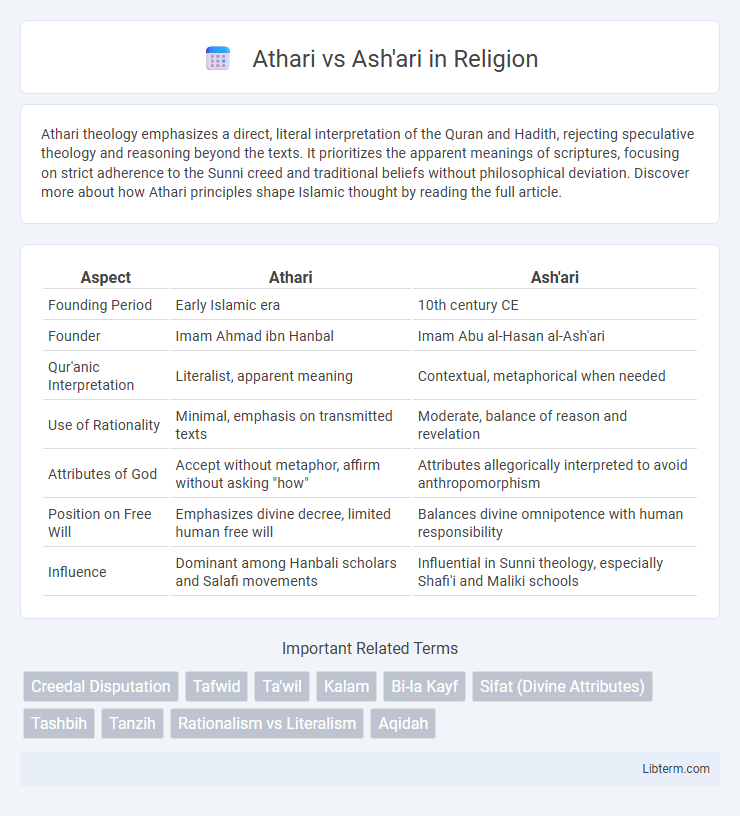Athari theology emphasizes a direct, literal interpretation of the Quran and Hadith, rejecting speculative theology and reasoning beyond the texts. It prioritizes the apparent meanings of scriptures, focusing on strict adherence to the Sunni creed and traditional beliefs without philosophical deviation. Discover more about how Athari principles shape Islamic thought by reading the full article.
Table of Comparison
| Aspect | Athari | Ash'ari |
|---|---|---|
| Founding Period | Early Islamic era | 10th century CE |
| Founder | Imam Ahmad ibn Hanbal | Imam Abu al-Hasan al-Ash'ari |
| Qur'anic Interpretation | Literalist, apparent meaning | Contextual, metaphorical when needed |
| Use of Rationality | Minimal, emphasis on transmitted texts | Moderate, balance of reason and revelation |
| Attributes of God | Accept without metaphor, affirm without asking "how" | Attributes allegorically interpreted to avoid anthropomorphism |
| Position on Free Will | Emphasizes divine decree, limited human free will | Balances divine omnipotence with human responsibility |
| Influence | Dominant among Hanbali scholars and Salafi movements | Influential in Sunni theology, especially Shafi'i and Maliki schools |
Introduction to Athari and Ash'ari Schools
Athari and Ash'ari schools represent two foundational theological approaches within Sunni Islam, with Athari emphasizing a literalist interpretation of the Quran and Hadith, prioritizing textual authenticity without extensive rational speculation. The Ash'ari school, founded by Abu al-Hasan al-Ash'ari, advocates a balanced method combining rational theology (kalam) with traditional scriptural sources to defend orthodox beliefs against philosophical challenges. Both schools significantly influence Islamic creed, shaping various Muslim communities' understanding of divine attributes and scriptural interpretation.
Historical Origins and Development
The Athari school, rooted in early Hanbali thought, emphasizes a literal interpretation of the Quran and Hadith, emerging prominently in the 9th and 10th centuries as a reaction against theological rationalism. The Ash'ari school, founded by Abu al-Hasan al-Ash'ari in the 10th century, developed through integrating rationalist methods with traditional Sunni theology to defend orthodox beliefs. Both schools significantly influenced Islamic theology by shaping discourse on divine attributes and creed during the formative period of Sunni doctrine.
Core Beliefs of the Athari School
The Athari school of Islamic theology emphasizes strict adherence to the Quran and Hadith, rejecting metaphorical interpretation of God's attributes to maintain the literal meanings. It upholds the principle of tanzih, which asserts God's transcendence and incomparability, avoiding theological speculation and rationalistic discourse prevalent in other schools like Ash'ari. Atharis rely on the apparent meanings of the texts, believing that human reason cannot fully comprehend divine essence, thus prioritizing textual evidence over analogical reasoning or philosophical argumentation.
Core Principles of the Ash'ari School
The Ash'ari school emphasizes the use of rationality to interpret the Quran and Hadith, asserting that divine attributes must be understood metaphorically to avoid anthropomorphism. It upholds God's absolute power and occasionalism, where all events occur through divine will rather than causal necessity. This theological framework contrasts with the Athari approach, which relies strictly on textual literalism and rejects speculative theology.
Differences in Theological Methodology
The Athari theological methodology emphasizes strict adherence to the Qur'an and Sunnah with a literal interpretation of divine attributes, rejecting rationalistic speculation and philosophical reasoning. In contrast, the Ash'ari approach employs kalam (Islamic scholastic theology), using rational arguments and metaphorical interpretation to reconcile revelation with reason. These methodological differences shape their distinct views on God's attributes, human free will, and the use of logic in theology.
Interpretation of Divine Attributes
The Athari school interprets divine attributes in a literal manner, affirming them without metaphorical explanation to preserve the transcendence of God. In contrast, the Ash'ari approach employs Ta'wil, a metaphorical interpretation, to reconcile divine attributes with God's unity and incomparability. This fundamental difference shapes theological discourse on God's nature within Sunni Islam.
Approach to Rationality and Reason
Athari theology emphasizes strict adherence to the Qur'an and Hadith, minimizing rational speculation to preserve the purity of revealed texts, asserting that human reason should not overstep scriptural boundaries. In contrast, Ash'ari theology integrates rational methods and kalam (Islamic scholastic theology) to interpret and defend Islamic beliefs, allowing reason to complement revelation and resolve apparent contradictions. This divergence highlights Athari prioritization of textual literalism and Ash'ari openness to rationalist discourse in understanding divine attributes and theological issues.
Influence on Islamic Thought and Scholarship
Athari theology, emphasizing strict adherence to the Quran and Hadith, profoundly influenced Salafi movements and traditionalist scholarship, advocating literal interpretations and skepticism of speculative theology. Ash'ari theology, developed by Abu al-Hasan al-Ash'ari, shaped mainstream Sunni thought through its rationalist approach, harmonizing reason with revelation and significantly impacting classical Islamic jurisprudence and theology. The tension between Athari and Ash'ari methodologies continues to shape debates on Islamic creed, legal theory, and scriptural interpretation across diverse Muslim intellectual traditions.
Prominent Figures in Each School
Prominent figures in the Athari school include Ahmad ibn Hanbal, known for his strict adherence to the Quran and Hadith without rational interpretation, and Ibn Taymiyyah, who emphasized a literal understanding of scripture. In contrast, the Ash'ari school is represented by Abu al-Hasan al-Ash'ari, the founder who developed the rational theology approach, and Fakhr al-Din al-Razi, known for his philosophical contributions to Ash'arite doctrine. These figures shaped their respective schools' theological methodologies and continue to influence Islamic thought today.
Contemporary Relevance and Impact
The Athari creed emphasizes strict adherence to the Quran and Sunnah with a literalist approach to theology, maintaining significant influence in modern Salafi and traditionalist Sunni circles, especially in regions like Saudi Arabia. The Ash'ari school, known for its rationalist interpretation and theological flexibility, shapes the mainstream Sunni thought in many parts of the Muslim world, including North Africa and the Middle East. Contemporary impact of these theological frameworks manifests in educational curricula, religious discourse, and sectarian dynamics, affecting inter-Muslim relations and interpretations of Islamic law.
Athari Infographic

 libterm.com
libterm.com